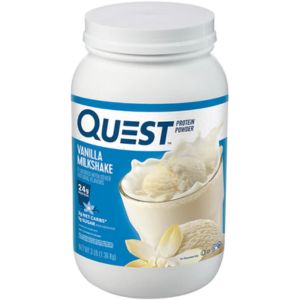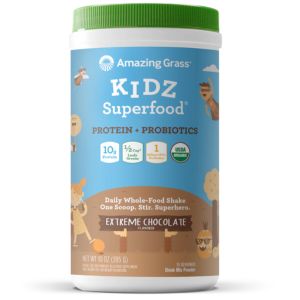 Expert's opinion
Expert's opinion
The article is a subjective view on this topic written by writers specializing in medical writing.
It may reflect on a personal journey surrounding struggles with an illness or medical condition, involve product comparisons, diet considerations, or other health-related opinions.
Although the view is entirely that of the writer, it is based on academic experiences and scientific research they have conducted; it is fact-checked by a team of degreed medical experts, and validated by sources attached to the article.
The numbers in parenthesis (1,2,3) will take you to clickable links to related scientific papers.
Best Protein Powder For Teens 2024: Top Brands For Adolescent
All articles are produced independently. When you click our links for purchasing products, we earn an affiliate commission. Learn more about how we earn revenue by reading our advertise disclaimer.
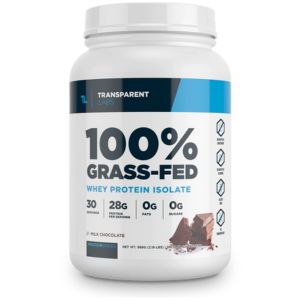
Transparent Labs 100% Grass-Fed Whey Protein Isolate
- Available in multiple flavors
- Third-party tested with Certificate of Analysis
- Free of artificial flavors and dyes
- 60-day return policy
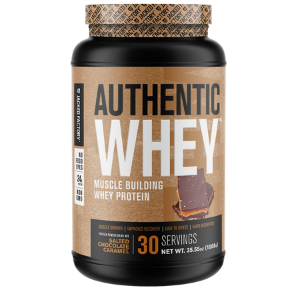
Jacked Factory Authentic Whey
- Formulated with athletes in mind
- Available in multiple flavors
- 90-day 100% money-back guarantee
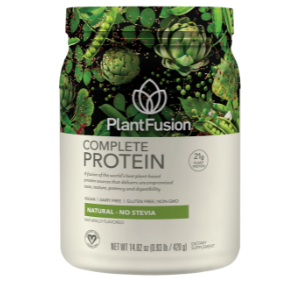
PlantFusion Complete Protein Vegan Protein Powder
- Has plant-based branched-chain amino acids (BCAAs)
- Third-party certified product
- Additional enzyme blend for digestion
25% Off Coupon: HEALTHCANAL
Protein is one of those nutrients that are vital to being healthy. From our muscles to the tiny processes in our bodies, we need protein. During the teenage years, protein becomes more important than ever for muscle growth, especially if they are active in sports.
Your teen may try their best to get enough protein in their diet with food, but it may not be enough. Sometimes, an extra boost with a protein shake for teens is needed to make sure they get the nutrition that they need.
If you are a teen or have a teen who needs more protein to meet their daily needs, we’ve got a list of the top protein powders for teens.
Best Protein Powder For Teenagers (April. 2024)
- Transparent Labs 100% Grass-Fed Whey Protein Isolate – Editor’s choice
- Jacked Factory Authentic Whey – Best for Athletes
- PlantFusion Complete Protein Vegan Protein Powder – Best for Vegans
- Naked Nutrition Grass-Fed Whey Protein Powder – Best Grass-Fed Whey
- Quest Protein Powder – Best Budget Protein Powder
- Amazing Grass Protein + Probiotics – Best Superfood Protein Powder
- Ora Organic So Lean & So Clean – Best for Teenage Girls
Best Protein Powder For Teens In 2024
Transparent Labs 100% Grass-Fed Whey Protein Isolate
Teens deserve high-quality protein powders that taste good. Transparent Labs grass-fed whey is a popular protein powder, that is rigorously tested and is free of ingredients you don’t need.
- Available in multiple flavors
- Third-party tested with Certificate of Analysis
- Free of artificial flavors and dyes
- 60-day return policy
- No subscription service is available online
Transparent Labs is considered one of the top sports nutrition supplement companies on the market. True to its name, Transparent Labs is transparent about its products and uses only necessary ingredients.
Their grass-fed whey protein is made from hormone-free cow whey and is free of artificial sweeteners, artificial preservatives, artificial coloring, gluten, and genetically modified organisms (GMOs). Transparent Labs even offers a Certificate of Analysis for all of their products to show that they are third-party tested for quality.
A single scoop serving of Transparent Labs 100% Grass-Fed Whey Protein Isolate is 120 kcals and provides 28 grams (g) of protein. Each container contains 30 servings of whey isolate.
Transparent Lab’s whey isolate comes in several flavors that teens can enjoy, including chocolate peanut butter, cinnamon french toast, french vanilla, mocha, and strawberry.
To use, mix one scoop of powder with at least 8 oz of water and enjoy!
If you’re not satisfied with your product, you may return dietary supplements purchased directly from the Transparent Labs website within 60 days.
Jacked Factory Authentic Whey
If you’re looking for the best protein powder for teenage athletes, Jacked Factory Authentic Whey is a great choice. It is high in whey protein, free of added sugars, and can be added to many recipes.
- Formulated with athletes in mind
- Available in multiple flavors
- 90-day 100% money-back guarantee
- Contains artificial flavors and artificial sugar
- Contains the controversial ingredient, Sucralose
Authentic Whey is a whey concentrate and isolated blend from Jacked Factory. Jacked Factory began in 2015 to support the performance of bodybuilders, athletes, and elite powerlifters who wanted to feel better.
Jacked Factory’s Authentic Whey contains both whey isolate and whey protein concentrate. Each serving of Authentic Whey provides 120 calories and 24 g of protein per serving.
Though Authentic Whey is free of added sugars, it contains sucralose and stevia extract. Sucralose[1] may adversely modify the gut microbiome and affect blood sugars. Although stevia is considered natural, many people do not like its flavor.
This whey protein powder is available in multiple flavors, including vanilla, chocolate, orange ice cream, and salted chocolate caramel.
For best results, take one scoop of whey powder after a workout. Authentic Whey is versatile and can be mixed with water, dairy alternatives, milk, or added to foods like oatmeal and yogurt.
Each container of Authentic Whey contains 30 servings of protein. Jacked Factory recommends taking a scoop of powder 1-4 times daily, depending on your individual workout needs.
Jacked Factory offers a subscription service that allows you to save 25% on your first order and 15% on recurring orders. Jacked Factory has a 90-day, 100% hassle-free money-back guarantee.
PlantFusion Complete Protein Vegan Protein Powder

25% Off Coupon: HEALTHCANAL
Sometimes the hardest part of regularly using a protein powder is the taste. PlantFusion makes an allergen-free plant-based protein shake that is highly tasty for teens to enjoy.
- Has plant-based branched-chain amino acids (BCAAs)
- Third-party certified product
- Additional enzyme blend for digestion
- Need to return unused, so cannot try and return
PlantFusion was founded in 2009 from a desire to find an allergen-free protein shake without extra fillers and highly processed ingredients.
PlantFusion Complete Protein vegan protein powder contains 21 g of organic pea protein, 4 g of plant-based branched-chain amino acids (BCAAs), and an enzyme blend of alpha-galactosidase and bromelain.
This plant-based protein powder is available in natural flavor (stevia-free), creamy vanilla bean, rich chocolate, red velvet, and cookies and cream flavors. PlantFusion Complete Protein is certified vegan, non-GMO, and kosher. It is also gluten-free and dairy-free.
PlantFusion Complete Protein is highly rated by customers for being delicious without a chalky aftertaste and is easily mixed into recipes. To use, add one scoop of protein to shakes, water, plant-based milk, or other recipes.
Plant-Fusion offers many size options to purchase – you can get your protein in 12 individual servings or purchase a 15, 30, or 75-serving container.
A subscription purchase can save you extra on your purchase. If you are not satisfied with PlantFusion products, they offer a 30-day money-back guarantee on online and retail purchases.
Naked Nutrition Grass-Fed Whey Protein Powder
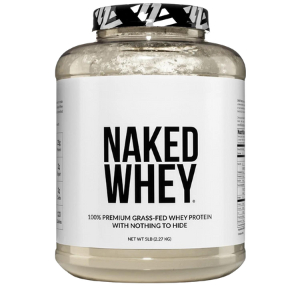
15% Off Coupon: HEALTHCANAL
Sometimes the best protein powder is the simplest. Naked Nutrition’s whey protein is made with simple ingredients so that you don’t have to worry about what your teen is getting in their protein powder.
- Informed Choice certified product
- Simple ingredient list
- Made using cold-processed whey protein
- Short return policy for unused products only
Naked Whey Grass-fed whey comes from the fitness supplement brand Naked Nutrition. This supplement brand makes grass-fed whey protein and other products with “nothing to hide,” using premium ingredients so that you know what goes into your body.
Naked Whey is made with 25 grams (g) of grass-fed whey protein concentrate and has 5.9 g of BCAAs. This protein powder is gluten-free, GMO-free, and soy-free.
Naked Whey is available as a plain powder or in chocolate, vanilla, or strawberry.
The plain Naked Whey protein powder only contains whey protein, and the other flavors use ingredients that you can easily recognize without artificial additives and ingredients.
A single serving of Naked Whey is two scoops, and it contains 120 kcal and 25 g of protein per serving. To use, mix two scoops into 6-10 ounces (oz) of water or another beverage, or add to a recipe to boost its protein content.
Each container of Naked Whey contains 72 servings of powder. You can make a one-time purchase or save by subscribing.
Naked Nutrition has a somewhat strict return policy. Unopened and unused items can be returned for a full return or exchange within 14 days.
Quest Protein Powder
Quest Nutrition makes protein supplements that come in a variety of flavors and don’t break the bank. If you’re looking for a low-carb and delicious protein powder for your budget, it’s here.
- Low in carbs and added sugar
- Variety of flavors
- 90-day return policy
- Some flavors are lower in protein
- Uses sucralose
Quest Protein Powder is made by Quest Nutrition, a company that started by making protein bars and has expanded to several protein-based snacks and foods.
Quest Nutrition’s mission is to make “the foods you crave work for you, not against you.” Their products have complete dairy-based protein, minimal carbs and sugar, and a large variety of flavors.
Quest protein powder contains between 20-26 g of protein (whey protein isolate and micellar casein) depending on what flavor you choose.
Quest protein powders are available in multiple flavors – salted caramel, chocolate milkshake, vanilla milkshake, peanut butter, cinnamon crunch, and cookies and cream.
Mix one scoop of Quest Protein Powder with 8 oz of water and drink after a workout or add into recipes.
You can purchase Quest protein powder in a 1.6-pound (lb) canister or a 3-lb canister to meet your needs. To save on your purchase, you can choose to start a subscription service.
Products purchased from the Quest Nutrition website can be refunded or replaced within 90 days.
Amazing Grass Protein + Probiotics
Amazing Grass Protein + Probiotics is specially formulated for children and adolescents and goes beyond a standard protein powder by providing superfoods via ½ cup of leafy greens per serving.
- Specially formulated for kids
- The formula includes superfoods and probiotics
- Free of artificial colors, flavors, and sugars
- Certified organic
- The company has a history of products containing heavy metals
Amazing Grass is a company that creates plant-based products made with nutrient-dense greens and superfoods to support your wellness journey.
Each scoop of Kidz Protein + Probiotics contains 10 g of pea protein, a blend with organic greens, fruits, and vegetables, and the probiotic B. coagulans GBI-30 6086.
B. coagulans GBI-30 6086 is a strain of bacteria that can aid in the digestion of protein,[2] improve gut dysbiosis, and reduce digestive symptoms like gas and bloating.
Amazing Grass Kidz Protein + Probiotics comes in Extreme Chocolate and Strawberry Blast.
This protein powder is free of artificial flavors, artificial colors, and fillers. Kidz Protein + Probiotics is also dairy-free, non-GMO, vegan-friendly, and United States Department of Agriculture (USDA)-certified organic.
To use, mix one scoop of Kidz Protein + Probiotics with 12 oz of water, plant-based milk, or other smoothies.
You can save money on your purchase with a subscription to Kidz Protein + Probiotics or by buying in bulk.
Amazing Grass products purchased from the website have a 30-day return or exchange policy if unopened. They will consider a one-time product replacement for opened products. Otherwise, you cannot refund opened Amazing Grass products.
Ora Organic So Lean & So Clean
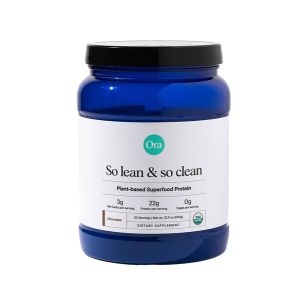
5% Off Coupon: HEALTHCANAL5
We consider So Lean & So Clean to be the best protein powder for teenage girl athletes and non-athletes because of its plant-based protein, superfoods, and digestive enzyme blend.
- Contains a superfood, greens, and an enzyme blend
- Third-party tested with Certificate of Analysis
- Available in multiple flavors without added sugar
- 60-day 100% money-back refund policy
- Larger serving size
- Contains a major allergen coconut
Ora is a wellness brand made with these practices in mind: plant-based nutrition, ethical sourcing, and wanting to help others be well.
Every batch of Ora products is third-party tested with a Certificate of Analysis available to assure that the products contain what they say they contain and are of high quality with no contaminants.
So Lean & So Clean is unique by not only providing 21 g of plant-based protein from peas and rice but also having a blend of 19 superfoods and greens. So Lean & So Clean also contains digestive enzymes to make digestion easier and prevent bloating.
Together, these ingredients can help support teenage girls’ nutrition, so they get what they need and more.
So Lean & So Clean is available as an unflavored powder, or you can choose from chef-designed flavors, including chocolate, vanilla, or vanilla chai. It is organic, vegan, kosher, non-GMO, and free of soy and dairy.
To use So Lean & So Clean, blend two scoops of powder with 8-12 oz of water or plant-based milk.
So Lean & So Clean is available in a 20-serving container or as a single-serving pack
Save on your first purchase when you subscribe. All products have a 60-day refund policy.
Why Is Protein Crucial For Teens?
Adolescence is the second greatest period of significant growth and development[3] after infancy. During this time, teens grow in height and size, begin puberty, and undergo further brain development. Protein is necessary for the everyday maintenance of muscle protein synthesis, muscle building, bone density, immune system function, and daily processes of their cells.
To support all of those processes, teens need to have adequate protein. Without enough protein, a teen can be at risk for malnutrition and potential stunting of development. Undernourished teenagers tend to have a shorter height, delays in puberty, weaker immune systems, and behavioral impairments.
How Much Protein Powder Should A Teenager Take?
The amount of protein powder a teenager takes should be based on their individual protein needs, athletic activity, and the amount of extra protein that they get from their diet.
The Institute of Medicine’s National Academy of Sciences created the Recommended Dietary Allowances[4] (RDA) for protein to determine the amount of protein that would meet the needs of about 97-98% of healthy people.
The RDA for protein is approximately 46 g daily for teenage girls and 52 g protein for teenage boys ages 14-18 years. A teenager’s protein needs can also be calculated by multiplying body weight in kg by 0.85 or weight in lbs by 0.39.
For active teenagers involved with sports, their protein needs may be closer to 1-1.5 g protein per kilogram (kg) of body weight. A kg is 2.2 lbs.
While teens do need protein to support normal growth and function, there is such a thing as too much protein. Excessive protein can lead to certain health risks that can affect teens in both the short term and long term.
Short-term symptoms of too much protein include nausea, diarrhea, and loss of appetite.
A 2019 study[5] found that high total and animal protein intake were associated with increased body fat. High animal protein intake was also associated with central obesity.
Excessive protein may also affect metabolism by decreasing insulin sensitivity[6] in people without diabetes.
Too much protein can also stress their organs. High-protein diets may increase the risk of kidney damage, especially diets high in animal protein.
Should a teenager take protein supplements, some professionals recommend that teenagers only take ½ scoop to 1 scoop of a typical protein powder daily to meet their needs.
How To Choose The Best Protein Shakes For Teens?
When you go to a sports nutrition supplement store or search online, there are endless options for protein powders. It can be difficult to determine for yourself what is the best protein powder for teens. While we’ve listed some of the most popular protein powder supplements, here are some tips on how you can choose the best protein shake for a teenager.
Look For Third-Party Tested Protein Powders
To make sure that teens are not exposed to any hidden chemicals or contaminants, look for brands that have products tested by third-party labs. Common third-party companies include the National Sanitation Foundation (NSF), Informed Choice, Informed-Sport, and ConsumerLab.com.
Find Protein Powders With Complete Proteins
To get the most out of your protein, choose protein powders made with complete protein like whey or casein. Choosing protein powders with added BCAAs can also make sure that teens are getting all the amino acids they need from their protein sources.
Choose Protein Powders That Promote Easy Digestion
Sometimes, protein supplements can be hard on digestion and cause nausea, bloating, and other digestive issues. Choosing plant-based protein powders can cut down on some of the symptoms, but protein powders that contain digestive enzymes and/or probiotics can also reduce symptoms.
Search For Clean Ingredient Lists
The best protein powder for teens is made with simple ingredients. When possible, look for a protein supplement without artificial flavors, sugars, dyes, or other artificial ingredients. Superfood ingredients, digestive enzymes, and probiotics are beneficial, clean ingredients that you may want to have in your protein powder.
Conclusion
Protein is essential for normal growth and development, becoming crucial during adolescence. Making sure that teens get enough protein sets them up to take on the challenges they experience daily.
When choosing the best protein powder for teens, consider whether plant-based or whey protein is best, if they need additional digestive support, and what superfoods they may need. If a plant-based protein supplement is desirable, ensure that all nine essential amino acids are present through a combination of protein sources.
Before starting new protein supplements, check with a doctor and a registered dietitian to determine what your teen’s protein needs are. They may be able to meet their needs through minor adjustments to their diet. Otherwise, high-quality protein powders help your teen perform at their best.
Frequently Asked Questions
Many protein shakes can be safe for teenagers if used properly and as a support to a diet with protein-rich foods. Choose protein shakes that are third-party tested for quality and safety and options that do not have artificial or harmful ingredients. Before starting a teenager on protein supplements, speak with their doctor or a registered dietitian first to see if a protein shake is necessary to help them meet their protein needs.
The amount of protein a teenager needs can depend on their age and physical activity level. The Recommended Dietary Allowance for protein is approximately 46 g daily for teenage girls and 52 g of protein for teenage boys ages 14-18 years. A teenager’s protein needs can also be calculated by multiplying weight in kg by 0.85 or weight in lbs by 0.39.
When choosing a protein powder, it is best to choose one with high-quality protein and all essential amino acids, also known as complete proteins. If your teen is an athlete, whey protein may be better for muscle growth and repair. Otherwise, other protein sources, including plant-based proteins like pea and brown rice protein, are good options to support protein intake.
+ 6 sources
Health Canal avoids using tertiary references. We have strict sourcing guidelines and rely on peer-reviewed studies, academic researches from medical associations and institutions. To ensure the accuracy of articles in Health Canal, you can read more about the editorial process here
- Schiffman, S.S. and Rother, K.I. (2013). Sucralose, A Synthetic Organochlorine Sweetener: Overview Of Biological Issues. Journal of Toxicology & Environmental Health Part B: Critical Reviews, [online] 16(7), pp.399–451. doi:https://doi.org/10.1080/10937404.2013.842523.
- Jäger, R., Purpura, M., Farmer, S., Cash, H.A. and Keller, D. (2017). Probiotic Bacillus coagulans GBI-30, 6086 Improves Protein Absorption and Utilization. Probiotics and Antimicrobial Proteins, [online] 10(4), pp.611–615. doi:10.1007/s12602-017-9354-y.
- Norris, S.A., Frongillo, E.A., Black, M.M., Dong, Y., Fall, C., Lampl, M., Liese, A.D., Naguib, M., Prentice, A., Rochat, T., Stephensen, C.B., Tinago, C.B., Ward, K.A., Wrottesley, S.V. and Patton, G.C. (2022). Nutrition in adolescent growth and development. The Lancet, [online] 399(10320), pp.172–184. doi:10.1016/s0140-6736(21)01590-7.
- Nih.gov. (2022). Office of Dietary Supplements – Nutrient Recommendations: Dietary Reference Intakes (DRI). [online] Available at: https://ods.od.nih.gov/HealthInformation/Dietary_Reference_Intakes.aspx.
- Segovia-Siapco, G., Khayef, G., Pribis, P., Oda, K., Haddad, E. and Sabaté, J. (2019). Animal Protein Intake Is Associated with General Adiposity in Adolescents: The Teen Food and Development Study. Nutrients, [online] 12(1), p.110. doi:10.3390/nu12010110.
- Mittendorfer, B., Klein, S. and Fontana, L. (2019). A word of caution against excessive protein intake. Nature Reviews Endocrinology, [online] 16(1), pp.59–66. doi:10.1038/s41574-019-0274-7.

